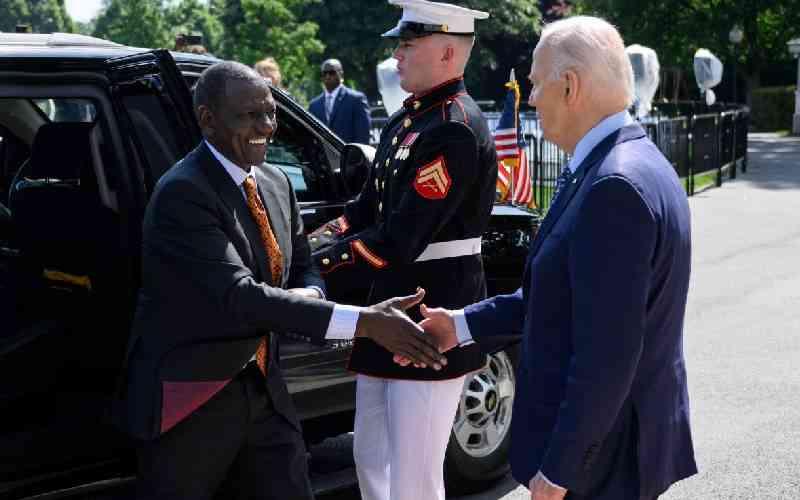
The government is pushing forward with the plan to embrace GMO. The Cabinet announced last month that after a 10-year suspension, Kenya would finally allow the importation and cultivation of GM crops.
The decision was arrived at during a Cabinet meeting chaired by President William Ruto, who said the move was meant to address the effects of the ongoing drought and food security, and was a progressive step towards significantly redefining agriculture in the country by adopting crops that are resistant to pests and disease.
It was a controversial decision, one that Kuria said at Strathmore University yesterday that they were convinced would pull Kenya out of one of its worst food crises yet.
The CS said the government's cardinal responsibility was to ensure the country was food secure. And to do that, it was prepared to let its popularity take a hit and receive criticism from anti-GMO advocates.
He said the government was prepared to offend a few people and lose popularity because it was convinced that it was taking the right step.
Kuria said the government would allow for the importation of duty-free maize until the country achieved food security.
"Until we are satisfied that there is enough maize in the country," he said.
But the decision, coming just a month after the government lifted the ban on GMO, is expected to draw sharp criticism from the campaigners.
It will also pit opposition leaders against the government. Raila last month said Ruto was playing with the lives of Kenyans.
The same sentiment greeted Kuria's announcement on Twitter yesterday.
Narok Senator Ledama ole Kina's concern was whether Kuria was the one who allows duty-free importation. "So who signs instruments to allow duty-free importation of GMO and Non-GMO Maize? Is it the cabinet secretary of trade or Finance/Treasury?" Kina tweeted.
Kuria's tweet read: "In view of the food situation in the country, I shall be signing instruments to allow duty-free imports of GMO and non-GMO Maize for the next six months."
The announcement, coming at a time when Microsoft's Bill Gates, a huge proponent of GM foods is in the country, has led to speculation that lobbying for the country to accept GMO could be part of the reason he is visiting.
Ruto welcomed Gates at State House on Tuesday and a dispatch issued after their meeting said they had discussed, among other issues, agriculture and food security.
Stay informed. Subscribe to our newsletter
"We will continue to collaborate towards the realisation of food security and universal health coverage in our country," State House tweeted.
Some of the maize that will be imported into the country could be from the US where more than 90 per cent of all maize cultivated is genetically modified.
Dr David Amudavi, the Director of Biovision Africa Trust, said that while it was important that no one died from famine, the government should solve the grain shortages in a responsible manner.
He said the government also needed to be more inclusive in its decision-making. He also wondered whether the government had considered Kenya's traditional markets for maize imports before opting for GMOs.
"Before deciding on GMOs, we need to ask ourselves whether there is a deficit in the markets that we source from. We also need to know what is in our reserves and what the projections for the harvests are," he said.
He said what the country was importing should be consistent with what was needed.
This year, the maize production is expected to fall to the lowest level in five years, according to data from the Ministry of Agriculture.
Farmers in the North Rift are currently harvesting this year's maize crop, which is projected to be 33 million 90kg bags. Kenya consumes more than four million bags a month and about 51 million bags are needed annually.
The falling harvest follows a consistent pattern from 2018. Maize production in 2021 was 38 million bags, down from 42 million bags in 2020. Some 44 million and 44.6 million bags were harvested in 2019 and 2018, respectively, while in 2017 the yield was about 35.4 million bags.
In the back of limited supply, farmers have been selling their harvest for as much as Sh5500 for a 90kg bag. They now fear that the importation of the 10 million bags duty free will likely cause prices to fall drastically.
Stephen Mugo, a director at the Centre for Resilient Agriculture for Africa (CRA-Africa), said it was natural that the immediate response was to import maize and not just because it is GMO but because it is the one variant that is available.
 The Standard Group Plc is a
multi-media organization with investments in media platforms spanning newspaper
print operations, television, radio broadcasting, digital and online services. The
Standard Group is recognized as a leading multi-media house in Kenya with a key
influence in matters of national and international interest.
The Standard Group Plc is a
multi-media organization with investments in media platforms spanning newspaper
print operations, television, radio broadcasting, digital and online services. The
Standard Group is recognized as a leading multi-media house in Kenya with a key
influence in matters of national and international interest.
 The Standard Group Plc is a
multi-media organization with investments in media platforms spanning newspaper
print operations, television, radio broadcasting, digital and online services. The
Standard Group is recognized as a leading multi-media house in Kenya with a key
influence in matters of national and international interest.
The Standard Group Plc is a
multi-media organization with investments in media platforms spanning newspaper
print operations, television, radio broadcasting, digital and online services. The
Standard Group is recognized as a leading multi-media house in Kenya with a key
influence in matters of national and international interest.





